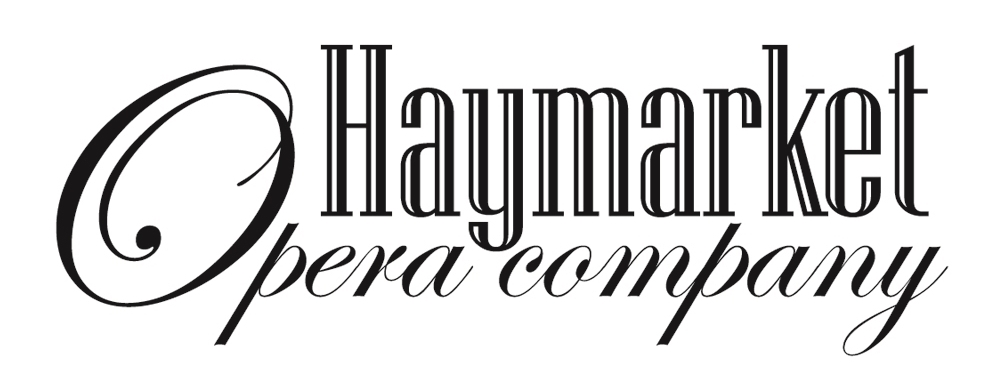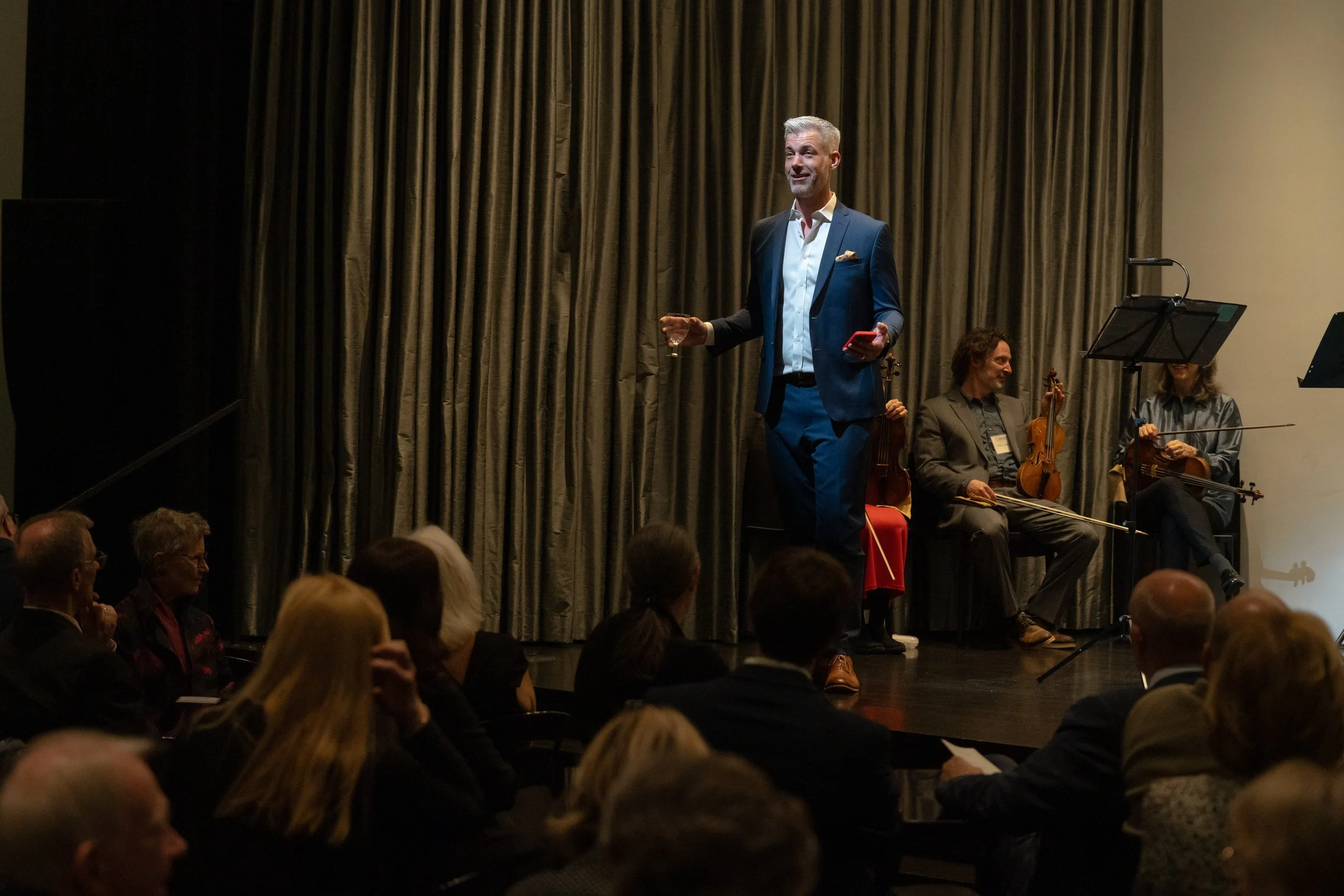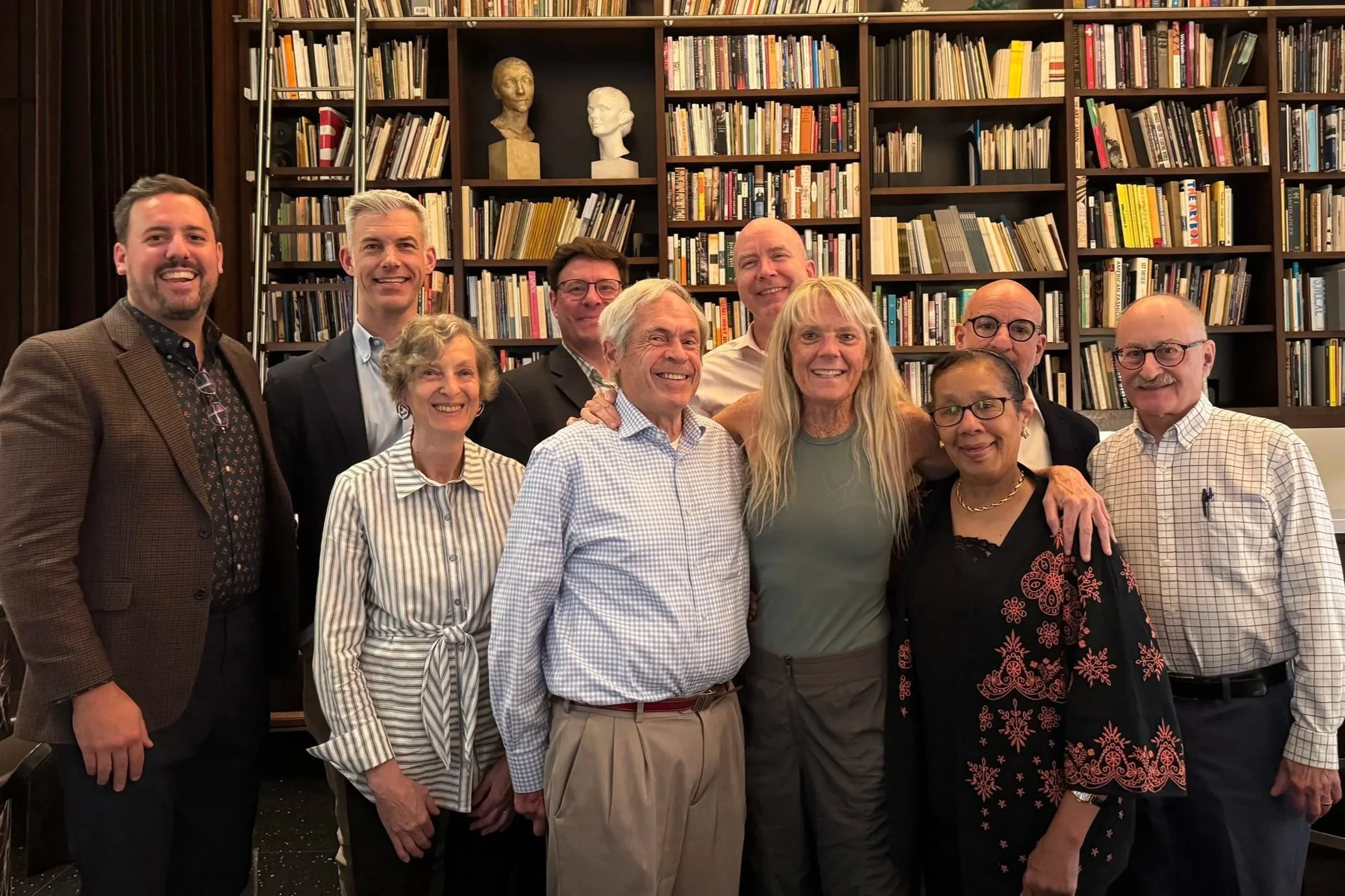Byron Harrison at the 2025 Early Opera Cabaret. Photo: Elliot Mandel.
Trustee Byron Harrison on Haymarket’s Strategy and 2025 Board Retreat with Marc Scorca
Summer has flown by. It feels like only yesterday that many of us gathered for an afternoon at the Ravinia Festival, enjoying a marvelous performance of Alcina. Yet here we are after Labor Day, and I’m looking back at how Haymarket began the summer. Right after Memorial Day, our board came together for our first-ever day-long retreat, joined by Marc A. Scorca, president and CEO of Opera America, the national service organization for opera in the United States.
I’ve known Opera America for many years through my work with Charcoalblue, a design company serving the performing arts. As business members, we’ve attended their excellent national conferences for both professional development and networking. Haymarket’s Chase Hopkins has been deeply engaged with OA, including as a conference panelist, and earlier this year my fellow trustee Karen Patricia Smith and I attended OA’s national trustee forum.
Haymarket Opera Company Board of Trustees at the Arts Club of Chicago, 2025.
So when Marc joined us in May, several of us were already familiar with his philosophy and approach. Still, there was something powerful about having our entire board together for a day of focused thinking and guided conversation. Opera America serves and represents a hugely diverse opera industry—companies performing anywhere from 7 to 70 times a year. Marc has honed a message of sustainability and relevance for the opera industry over his 35 years at the helm of Opera America, finding common threads across the whole field.
From my own experience at OA gatherings, one theme is consistent: opera companies everywhere are searching to clarify their identity while striving to grow audiences. Many are actively balancing inherited repertoire, new works, and crossover popular programming in hopes of finding the right mix that will sell tickets. Haymarket, by contrast, has a unique identity and a clarity of purpose. Our audiences know what to expect. Our offering has limited overlap with other presenters; we collaborate more often than we compete. We consistently play to nearly full houses, defying national trends. Because of this, our boardroom conversations often sound very different from those of our peers.
That said, we are not immune to today’s realities. Rising costs affect us too, even as we aspire to mount more fully staged productions. We feel a responsibility to contribute meaningfully to the cultural life of Chicago and the Midwest—not only through our artistry, but also by being a dependable source of market-rate employment for artists, creatives, technicians, and administrators. These aspirations carry real costs.
In the intervening time since our retreat, the media’s reporting on opera has zeroed in on a consistent message: opera companies are seeing rapidly rising expenses and are performing less often. It’s been a theme expressed by Lyric Opera of Chicago General Director (and Haymarket Review contributor) John Mangum; the same message has been used to explain the recent announcement of the Metropolitan Opera’s Saudi Arabia partnership. These trends are validated by the data aggregation and analysis that Opera America provides to the industry.
So how does Haymarket chart a different course?
Marc A. Scorca. Photo: Jc Olivera Photography
At our retreat, Marc encouraged us to focus on institutional strength and value, rather than growth for its own sake. Fundraising must rise to meet inflation and production costs, but true growth should be inspired by the excellence of our work—not pursued as an end in itself.
He also offered a framework to help organizations like ours manage the risks of ambition. He urged us to evaluate “surplus” and “deficit” across four dimensions: financial, artistic, civic, and human. Every project might emphasize some at the expense of others, but a balance across the whole is what sustains vitality. This perspective gives us both a discipline and a freedom—to take bold steps while keeping sight of what matters most.
What, then, can we expect from Haymarket’s next fifteen years? Firstly, we want to invite more voices—supporters, artists, audiences—into shaping this vision. We aim to be an even stronger civic presence, a more professional and reliable employer, and a more resilient organization, capable of taking risks and weathering the unexpected.
And artistically? You have already witnessed the ambition, talent, and wisdom of our leadership. The board is confident that Haymarket’s artistic mission will remain sharp and undiluted, even as we grow. In fact, it is precisely our focus and clarity that will allow us not only to sustain what we’ve built but to expand its impact in Chicago and beyond.
About the author
Byron Harrison premiered the acoustics practice at Charcoalblue as a solo practitioner in 2010. Under his design direction and leadership, the firm now has twelve full-time acousticians. He was welcomed in the Charcoalblue partnership in 2017.
As a specialist in the technical coordination and delivery of complex schemes for performing arts buildings, Byron has experience in the detailed analysis and detailing of sound separation between critical spaces, including coordination with building structures to achieve cost-effective and buildable solutions to acoustic challenges. He has delivered many schemes with low background noise due to building systems, demanding accurate prediction of noise levels to meeting design criteria efficiently and without over-design.
Byron has been principal acoustics designer on Charcoalblue projects such as St Ann’s Warehouse, Brooklyn, the theatre and chamber opera venue at Chateau d’Hardelot in France, the 1,100-seat Energy Hall in Astana, Kazakhstan, and the Wharf Renewal project for Sydney Theatre Company in Australia. Other completed projects include The Yard at Chicago Shakespeare Theater, Steppenwolf Theatre in Chicago, Bristol Old Vic Studio Theatre and Foyer in London, and the Waterfront Theatre for the Esplanade, Singapore. He was one of the lead designers of the Waikato Regional Theatre in Hamilton, New Zealand, which is currently in construction. He is leading Charcoalblue's work for the Renewal project for the Barbican Centre, London.
Byron Harrison joined the Haymarket Opera Company board of trustees in 2024.
About The Haymarket Review: This new digital publication including thoughts about the work produced by Haymarket is designed to deepen our connection to audiences, nurture and feed audience curiosity about historical performance, offer critical opinions and thoughtful reflections on our performances, and provide a forum for Haymarket and its audience to connect through sharing insights, opinions, learning, and expertise.





